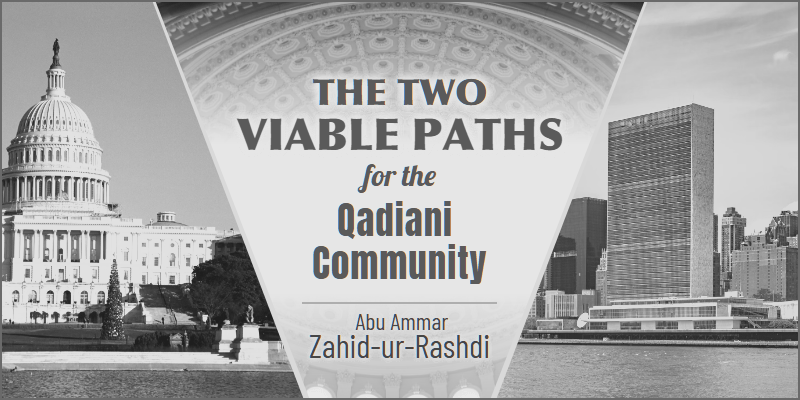Today, I would like to discuss a critical aspect of the Qadiani issue related to the preservation of the finality of prophethood, that when we and the Qadianis unequivocally acknowledge that their religion is distinct from ours and that we do not share the same faith, then why do the Qadianis insist on using the name, terms, symbols, and titles associated with the Muslim religion? Despite following a different and novel religion, why are they unwilling to adopt their own distinctive name, signs, terms, and rituals?
This is currently our primary point of contention with the Qadianis. They have leveraged this issue to confront Muslims in international institutions and the world media. Unfortunately, many international organizations and forums are supporting and backing them without sufficient justification.
In this context, I would like to present evidence to you, gentlemen, demonstrating that while we categorize the Qadianis as followers of a new religion separate from Islam, the Qadianis themselves have formally announced this at various stages. I would like to highlight five such occasions:
- Mirza Ghulam Ahmad Qadiani, in addition to his claim of prophethood, declared that those who did not believe in him, regardless of their location, were not Muslims. This was a clear indication that he did not consider Muslims worldwide as part of his religion if they did not accept his claims. Mirza Qadiani used harsh language towards those who did not believe in him, which I will not mention here. Given that Mirza Qadiani did not consider those who did not believe in him to be part of his religion, the Qadianis should abandon their insistence on being associated with the Muslim religion, as there is no justification for it.
- After the death of Mirza Qadiani's successor, Hakeem Nooruddin Bhairavi, the Qadiani religion split into two factions.
Maulvi Muhammad Ali, the head of the Lahori group, along with many of his colleagues, declared that they considered Mirza Ghulam Ahmad Qadiani as their leader but did not accept him as a prophet. Mirza Bashiruddin Mahmood, the son of Mirza Qadiani and head of the Qadiani Jamaat at that time, declared them followers of a different religion and excluded them from the "Circle of Islam."
This was a direct declaration that they considered only those who believed in Mirza Qadiani as their co-religionists, excluding all other groups and individuals worldwide.
According to our perspective, both the Qadiani and Lahori groups have the same status and are unrelated to Islam. However, the Qadianis declared Mirza's followers as having a different religion because they did not consider Mirza Qadiani as a prophet. This clearly implies that they considered their religion as the most separate and distinct religion. It is therefore surprising that they are not willing to adopt different name, rituals, and symbols for this distinct religion. - Before the Red Cliff Commission, established for the partition of Punjab during the creation of Pakistan, the Qadianis presented their case separately for the population of Qadian and Gurdaspur district, instead of identifying as Muslims. This led to Gurdaspur being annexed to India instead of Pakistan, resulting in the Kashmir issue. This was formal documentary evidence from the Qadianis that they were followers of a new religion separate from Islam.
- After the establishment of Pakistan, the prominent Qadiani leader Chaudhry Zafarullah Khan served as the foreign minister in the cabinet of Quaid-e-Azam Muhammad Ali Jinnah, the founder of Pakistan. However, after the death of Quaid-e-Azam Muhammad Ali Jinnah when the funeral prayer led by Maulana Shabir Ahmad Usmani, Zafarullah Khan, despite being present, did not attend the funeral. According to national press records, he responded to inquiries by stating that he should be considered either an infidel minister of a Muslim government or a Muslim minister of an infidel government. This was also a clear indication that the religion of the Qadianis differed from that of the Muslims.
- During the 1974 debate in the elected parliament of Pakistan regarding the Qadiani issue, which ultimately led to the constitutional declaration of the Qadianis as a non-Muslim minority, the heads of both groups of the Qadiani Ummah, the Qadianis and the Lahoris, Mirza Nasir Ahmad and Maulvi Sadar Deen, were given the opportunity to present their positions before the National Assembly. They participated in the debate for several days. At that time, Mirza Nasir Ahmad made a clear announcement on the floor of the Parliament that he did not consider those who did not believe in Mirza Ghulam Ahmad Qadiani to be part of his religion and that they were all excluded from the "circle of Islam" according to him.
Maulvi Muhammad Ali, the head of the Lahori group, along with many of his colleagues, declared that they considered Mirza Ghulam Ahmad Qadiani as their leader but did not accept him as a prophet. Mirza Bashiruddin Mahmood, the son of Mirza Qadiani and head of the Qadiani Jamaat at that time, declared them followers of a different religion and excluded them from the "Circle of Islam."
This was a direct declaration that they considered only those who believed in Mirza Qadiani as their co-religionists, excluding all other groups and individuals worldwide.
According to our perspective, both the Qadiani and Lahori groups have the same status and are unrelated to Islam. However, the Qadianis declared Mirza's followers as having a different religion because they did not consider Mirza Qadiani as a prophet. This clearly implies that they considered their religion as the most separate and distinct religion. It is therefore surprising that they are not willing to adopt different name, rituals, and symbols for this distinct religion.

